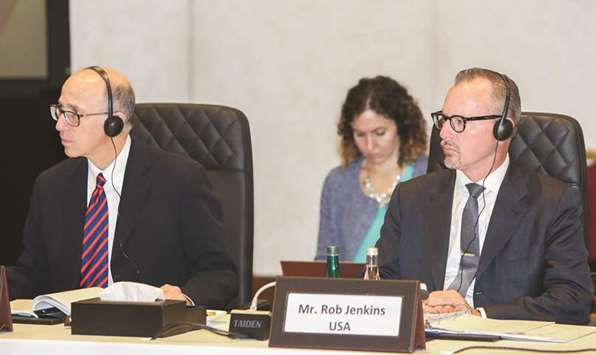The United Nations has praised the important role played by major donors to support Syria in order to alleviate the suffering of the people of the country.
A meeting of top Syria donors was held in Doha on Wednesday under the chairmanship of the UN Secretary-General’s Humanitarian Envoy Dr Ahmed bin Mohamed al-Muraikhi, which discussed mechanisms to achieve the pledges made by the donor countries in previous meetings and conferences.
The meeting especially discussed the Brussels Conference, and the mechanisms of co-operation of these countries with each other and with the UN organisations and non-governmental organisations working on the ground to achieve the greatest possible benefit for the Syrians and discuss all issues and challenges facing the implementation of the work by the humanitarian assistance by the United Nations and donor countries.
Al-Muraikhi called on the donors to focus not only on financial commitments, in which they have made significant strides, but also on non-financial pledges and consideration of future needs.
He urged the donor countries not to depart from the UN’s humanitarian response plan for Syria, as this places more emphasis on the actual needs of refugees and displaced persons, and that projects by the United Nations and non-governmental organisations are not repeated.
Al-Muraikhi noted the role of meetings between supporters in promoting dialogue and dynamic participation among them, stressing that the major donors expressed a strong support at the Brussels conference in support of Syria and the region last April for a better humanitarian action more effective in order to alleviate the sufferings of the Syrian people.
Out of the $6bn in funding pledged at the Brussels conference, $5.3bn has been implemented, he said, praising the donors’ commitment to their commitments, noting that it is important that donors continue to provide the necessary support as the needs of the Syrian people are increasing, especially with the onset of winter and the emergence of new challenges.
Al-Muraikhi highlighted the role played by the host countries of more than 5mn Syrian refugees in their societies, pointing out that the political, economic and social consequences of hosting them are a heavy burden on these countries.
He added that the support goes beyond money alone and reaches the important political commitments made at the Brussels and London conferences, as confirmed at the United Nations General Assembly, noting that the measures taken to support education in Lebanon or business and investment in Jordan shows that the donor community stands firmly and strongly alongside the region to respond fully to the consequences of the conflict in Syria.
The United Nations attaches great importance to the humanitarian issue in Syria, the official said, recalling the UN Secretary-General’s letter two months ago on World Humanitarian Day, in which he said that millions of civilians around the world who have suffered from conflict must be highlighted.
Al-Muraikhi spoke about the condition of the healthcare and education workers and the recent attacks on hospitals after a relative calm, which led to the reduction of these services.
“We must remain firm in our collective agenda of condemning such attacks that haven left 830 medical professionals dead since the beginning of the conflict and the destruction of a healthcare system already struggling to provide assistance. Civilians and civilian infrastructure emphatically cannot be targets,” he said.
“The international community demands an end to these attacks, particularly those that may amount to war crimes.”
Al-Muraikhi said that “of those Syrian civilians who escape attack, one in three lacks reliable access to food. Syrians have to resort to food coping strategies to cover the severe food shortages.”
Continued food insecurity has immediate effects on the population in terms of their next meal but the indirect long-term effects on Syrian youth are is devastating,” he added.
Al-Muraikhi said that “hostilities in several governorates, including Al Raqqa, Idlib, rural Damascus, Hama and Daraa have further increased humanitarian needs among civilians with protection threats increasing as winter approaches,” adding that the burden of “protracted siege has continued to contribute to acute needs among hundreds of thousands of civilian.”
He said, “access to such areas remains minimal, contravening the obligations of armed actors to facilitate rapid, safe, unhindered, unconditional and sustained access to people in need.
Although humanitarian partners continue to prioritise assistance to people facing the most severe needs, I urge all of you to use your influence to ease restrictions as access is fundamental in enabling the unimpeded provision of principled humanitarian assistance to people in need,” al-Muraikhi said.
Regarding the requirements of donor countries to guide their assistance to a specific region or a particular group, al-Muraikhi stressed that there are no requirements but some countries have an interest in education and health and the UN provides the necessary facilities for these countries to provide what they see within the limits of the plans for the Syrian inside and for the displaced and refugees in neighbouring countries.
The UN envoy for humanitarian affairs said plans have been put in place for reconstruction in Syria immediately after reaching a peaceful solution to the crisis and there is a full study of the needs required by the reconstruction process, especially with the talk of the return of refugees in neighbouring countries to safe places inside Syria.
Rashid Khalikov, the assistant secretary-general of the UN for humanitarian partnerships with the Middle East and Central Asia, praised the role of Qatar and its continued and sustained contributions to support Syria and in the field of humanitarian assistance in general.
Ziad Faisal al-Mishaan, member of the Department of International Organisations in the Kuwaiti Ministry of Foreign Affairs, praised Qatar’s role in continuing to host this meeting and its tangible efforts in raising the efficiency of humanitarian action, which reflects the deep understanding of the GCC countries for the human suffering of the Syrian brethren.

Officials attend a meeting of the top Syria donors’ group in Doha.
